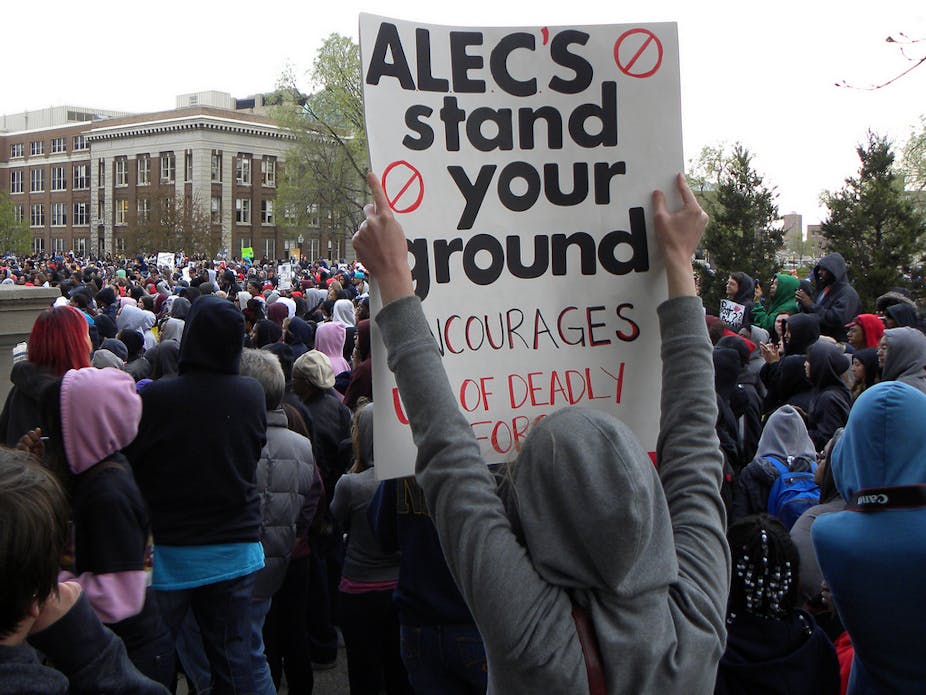Earlier this week, a Florida court began hearing arguments in the murder trial of an older, white man accused of murdering an African-American teenager.
If you think this sounds familiar, you’re right. The case of Mark Dunn, who, in 2012, fatally shot Jordan Davis, a 17-year-old African-American, has been compared to the 2013 murder trial of George Zimmerman over the shooting of Trayvon Martin. It has attracted international attention because, like the Zimmerman case, it raises the thorny issue of the “Stand Your Ground” defence in the American justice system.
Dunn claims he approached the teenagers playing loud music in their car. When he asked them to turn the music down, an altercation ensued. Dunn, claiming he saw one of the teenagers holding a gun, pulled out his own gun and fired eight times into the car.
He and his girlfriend then drove away, leaving Davis to die in the back seat of the car. Police later found no weapon at the scene.
Florida’s Stand Your Ground law provides that:
A person who is not engaged in an unlawful activity and who is attacked in any other place where he or she has a right to be has no duty to retreat and has the right to stand his or her ground and meet force with force, including deadly force if he or she reasonably believes it is necessary to do so to prevent death or great bodily harm to himself or herself or another or to prevent the commission of a forcible felony.
Dunn’s attorney has said that Dunn acted in self-defence, and was behaving:
… as any responsible firearm owner would have under the same circumstances.
The case once again highlights the problematic nature of Stand Your Ground laws, which have been implemented in almost 20 states across the US.
Evolution of Stand Your Ground
Stand Your Ground is a direct contradiction to the English common law tradition known as the “duty to retreat”. When faced with a threat to one’s security or life, a person had a duty to remove themselves from the scene.
If this proved impossible, then self-defence – even if it resulted in the death of the attacker – was acceptable under the law. The one exception to this rule is known as the castle doctrine, where a person has no duty to retreat within their own home.
Challenges to the duty to retreat have a long history in America. Erwin v. State (1876) introduced the term “true man” to describe the duty of the American man to stand his ground against any threat to his person. In State v. Gardner (1905), judge Edwin A. Jaggard argued that the relationship between the “frontier” character of rural America and the deadly power of guns combined to make the duty to retreat doctrine unrealistic.
In the 20th century, states across America adopted variations of the castle doctrine, and the right to Stand Your Ground in a violent altercation became the norm in many states. In 2005, however, Florida enacted wide-reaching changes to its criminal laws in three main areas:
In certain circumstances, it was no longer necessary to prove that one was in reasonable fear for one’s safety;
The Castle Doctrine was extended to include any place a person had a right to be. This included vehicles and any dwelling where the person had permission to be;
A person using this defence was now immune to criminal prosecution.
Racial discrimination in criminal justice
The Zimmerman and Dunn trials raise serious questions about the effectiveness of Stand Your Ground laws and the disproportionately negative impact they are having on African-Americans. Several recent studies have shown that states with Stand Your Ground laws have actually had an increase in homicides as opposed to the expected decrease.

One explanation, given by Harvard professor Ronald S. Sullivan Jr. in prepared testimony before the US Congress, is that Stand Your Ground laws have:
… the invidious potential to encourage the very sort of vigilantism that ordinary law eschews. Indeed, it encourages a Wild West mentality that protects the ‘true man’ who engages in battle.
Both Zimmerman and Dunn have demonstrated precisely this kind of vigilante mindset when justifying their actions in fatally shooting another human being. Zimmerman’s role as part of his neighbourhood watch formed an essential part of his defence. That he was out protecting his neighbourhood explained in part why he approached Trayvon Martin the first place.
Dunn, in letters written while in prison, has claimed that black people are “thugs” and:
… if more people would arm themselves and kill these [expletive] idiots, when they’re threatening you, eventually they may take the hint and change their behaviour.
Stand Your Ground laws have exacerbated the already prevalent discrimination in America’s criminal justice system. Another recent study assessing the impact of these laws found that a white man killing a black man is six times more likely to be acquitted when using the SYG defence.
The opposite is true if the defendant is black. Stand Your Ground implicitly justifies a new breed of vigilante who has little regard for human life. What is even more troubling is that when a young black man is the target of this type of violence, it cannot be separated from patterns of racial discrimination in the American criminal justice system and society more broadly.
As more states adopt these laws, it seems inevitable that there will be more cases where young men like Martin and Davis are killed simply because they are young and black.
This article has been amended since publication.

